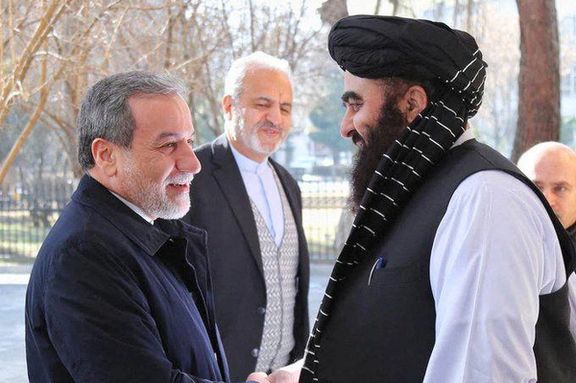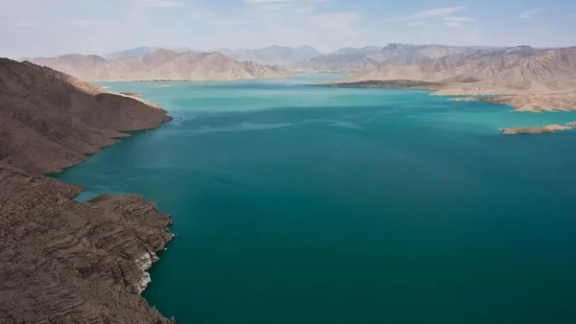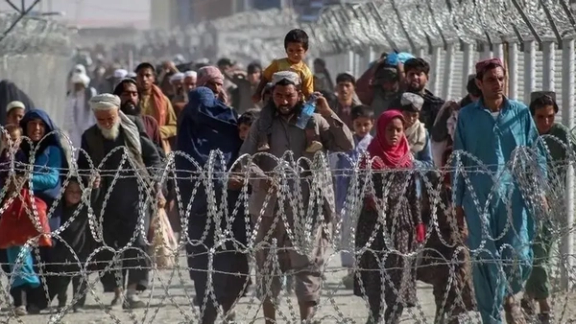FM's Kabul visit aims to bolster Iran-Taliban ties

In a move signaling renewed engagement, Iranian Foreign Minister Abbas Araghchi visited Kabul on Sunday for high-level talks with the Taliban leadership.

In a move signaling renewed engagement, Iranian Foreign Minister Abbas Araghchi visited Kabul on Sunday for high-level talks with the Taliban leadership.
The visit, the first by an Iranian foreign minister since the Taliban's 2021 return to power, focused on trade relations, the return of Afghan migrants, and Iran’s contentious water rights from the Helmand River.
Esmail Baghaei, spokesperson for Iran’s Ministry of Foreign Affairs, wrote in a message on X: "This visit could be a turning point in leveraging the numerous ties between the two nations to secure the mutual interests of both countries."
On Sunday, Araghchi met with Mullah Mohammad Hassan Akhund, the Taliban's acting prime minister, and Amir Khan Muttaqi, the acting foreign minister.
Water rights dominate discussions
One key issue discussed was Iran's longstanding dispute over water rights from the Helmand River, vital for Iran’s drought-stricken Sistan-Baluchestan province which relies on the Helmand River to sustain its wetlands, including the Hamoun Lake.
Iranian officials emphasized that Afghanistan must honor its obligations under the 1973 Helmand Water Treaty.
Iranian media reported on Sunday that Taliban representatives assured Araghchi they were working to ensure water flowed to Iran without waste.

There have been escalating tensions over the construction of dams on transboundary rivers, which have significantly reduced water flow to Iran’s drought-stricken eastern provinces.
The recently completed Pashdan Dam on the Harirud River in Afghanistan has become the latest focal point in the longstanding dispute.
Afghanistan’s water management projects have attracted foreign investment, adding complexity to the issue.
Countries such as China and Turkey are leveraging Afghanistan's water sector to establish strategic footholds in the region. The Pashdan Dam itself was built with assistance from an Azerbaijani firm, highlighting the international dimensions of the dispute.
The issue now dates back decades. In 1999, the Taliban completely halted the flow of the Helmand River, causing significant environmental and economic hardship for Iran.
Although a 1973 treaty guarantees Iran a share of the river's water, enforcement has been inconsistent, often leaving Iran's eastern provinces in a state of crisis.
Migration challenges and security concerns
Araghchi’s visit also addressed the repatriation of undocumented Afghan migrants. Iran, which hosts millions of Afghans, has ramped up deportations, with nearly three million undocumented individuals sent back in the past three years, according to government figures.

The discussions come against a backdrop of heightened border tensions and security concerns for both sides. Amir Khan Muttaqi called the visit “an opportunity to deepen brotherly ties between two neighboring Muslim nations that have shared both grief and joy."
Iran shares over 900 kilometers (560 miles) of its border with Afghanistan and hosts one of the largest refugee populations globally, predominantly Afghans who fled during more than two decades of war.
Afghanistan has historically seen a steady flow of migrants into Iran. However, following the Taliban's takeover of Afghanistan, this influx has surged, with millions crossing the border.
Some reports indicate that up to 10,000 Afghans have been entering Iran daily, pushing the Afghan population in the country to nearly 10 million.
Many Iranians have criticized the government for failing to secure the border, suspecting that it intends to use Afghan migrants as foot soldiers—both to suppress discontent within the domestic population and to deploy across the region to bolster its military allies and proxies, as documented by Human Rights Watch.
In December, Iran's ambassador to the United Nations, Amir Saeid Iravani, said that "over six million Afghans have sought refuge in Iran."
Economic prospects in focus
Trade featured prominently in Araghchi’s agenda, with a specialized Iranian delegation accompanying him, Afghanistan a key partner for Iran, with bilateral trade volumes reaching $3.2 billion last year.
Iran aims to increase this figure to $5 billion in two years, supported by infrastructure projects like the Khaf-Herat railway and the development of the Dogharoon trade zone.
"The economic relations between Iran and Afghanistan are at a very good level," Araghchi said during the meetings, expressing hope for their further enhancement.
Zakir Jalali, a senior Taliban foreign ministry official, hailed Araghchi’s visit as a “gateway to a new phase in relations.” Economic cooperation, Jalali noted, is essential for addressing mutual challenges and leveraging shared cultural and historical ties.
Iran has not officially recognized the Taliban as the legitimate government of Afghanistan, with countries such as the EU, US and UK still designating them as a terrorist organization.
However, Iran maintains a pragmatic approach. Following the Taliban's takeover of Afghanistan in August 2021, Iran kept its embassy in Kabul open and has continued to engage with Taliban officials.